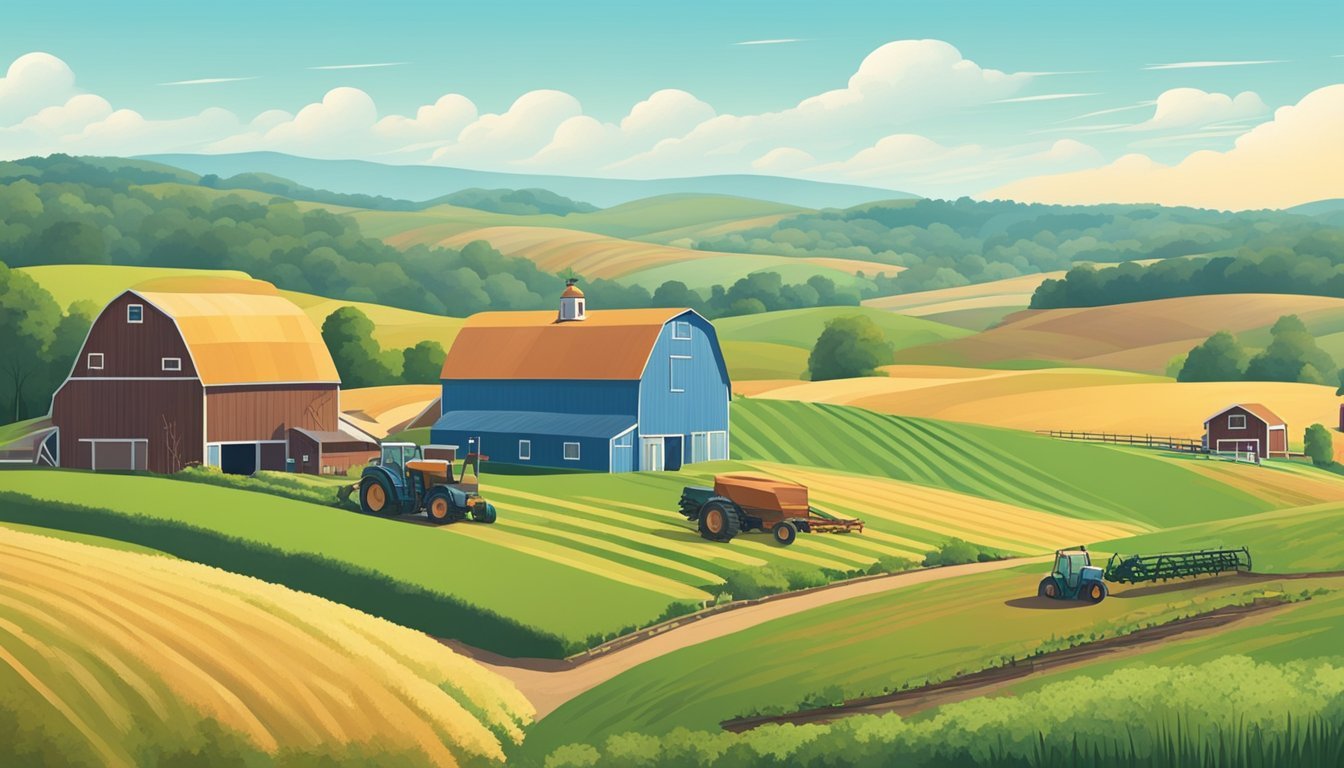Farm Loans in West Virginia
Navigating Financial Options for Farmers
This Article is Part of Our Guide on Farm Loans for All 50 U.S. States
West Virginia's agricultural sector, characterized by its diverse terrain and climate, offers opportunities for various farming operations including livestock, orchards, and traditional crop farming. To support the growth and sustainability of these farms, farm loans in West Virginia are readily available through a variety of financial programs. These loans cater to the needs of farmers looking to purchase land, expand their operations, or invest in improvements for soil and water conservation.
Among the primary sources for farm loans in the state is the USDA Farm Service Agency (FSA), which provides Direct Farm Ownership Loans to eligible applicants. These loans are designed to assist family farms with purchasing land, expanding their operations or making capital improvements. Private lenders, including financial institutions like Farm Credit and Farm Plus Financial, also play a significant role in the agricultural finance landscape by offering competitive interest rates for farm loans in the state.
In West Virginia, farmers and ranchers can find tailored financial solutions to start, expand, or maintain their operations through these lending options. Whether sourced from government-backed agencies with the benefit of promoting conservation efforts or from private lenders with flexible and competitive financial products, these loans are integral to ensuring the vitality and continuation of the state’s agricultural heritage.
Understanding Farm Loans
Farm loans are essential financial instruments that enable farmers and ranchers in West Virginia to start, sustain, or expand their agricultural operations. They come with varying conditions and requirements tailored to the unique aspects of farm management and growth.
Types of Farm Loans
There are several loan options available for those involved in agriculture. Operating loans are used to cover day-to-day expenses, whereas ownership loans cater to those wanting to purchase or improve farmland. Microloans, specifically designed for smaller, niche operations, provide a more accessible option for beginning farmers and those needing lesser amounts of capital. The USDA Farm Service Agency (FSA) also provides targeted funds for underserved applicants, which can include loans for farm improvement and expansion.
Farm Operating Loans: Covers expenses like seeds, equipment, and livestock.
Farm Ownership Loans: For purchasing farmland or making capital improvements.
Microloans: Smaller loans with a simplified application process.
Eligibility Criteria for Borrowers
Eligibility for farm loans in West Virginia requires meeting certain criteria that typically include the borrower's credit history, farming experience, and the viability of their farm. Beginning farmers or ranchers may find tailored programs with more flexible requirements designed to encourage new entrants into agriculture. Equity in the form of land or other assets is often necessary to secure a loan.
Credit Requirements: Adequate credit score and financial history.
Experience: Proof of farming competency and business management.
Equity: Necessary collateral, often in land, equipment, or capital assets.
Farm Loan Application Process
Applying for a farm loan involves a considerable amount of paperwork and detailed financial statements. The process starts with gathering all relevant documents, which may include business plans, farm records, and proof of income. Prospective borrowers often work with dedicated relationship managers or loan officers to help navigate the application process. The FSA's website provides resources and forms that guide farmers and ranchers through each step.
Documentation: Collect business plans, farm records, personal and farm income statements.
Application Submission: Complete and submit the necessary forms to the appropriate agency or lender.
Loan Evaluation: The lender reviews the application, assesses risks, and decides on the loan approval.
Financing Farm Operations
Farm operations in West Virginia have access to a variety of financing options to support their agricultural activities. These programs include loans for day-to-day operations, purchasing equipment and livestock, and investing in crop production.
Operating Loans and Credit
Operating loans and lines of credit are critical financial tools for farmers to manage their daily expenses. They cover costs such as seed, fertilizer, utilities, and labor. In West Virginia, farmers can obtain these loans from the USDA Farm Service Agency, which offers support for eligible beginning and socially disadvantaged farmers with a reduced interest rate.
Operating Loans: Funds for daily farm expenses
Lines of Credit: Flexible borrowing options for ongoing costs
Purchasing Equipment and Livestock
To remain competitive and efficient, farmers often need to invest in new equipment and livestock. Financing for these investments comes in the form of equipment purchase loans. Lenders understand the importance of modern machinery in farming and offer loans tailored for purchasing tractors, irrigation systems, and livestock.
Equipment Loans: Specialized loans for machinery and technology upgrades
Livestock Financing: Loans designed for purchasing animals to expand herd size or improve genetic stock
Loan Options for Crop Production
West Virginia's crop producers rely on dedicated loan options for planting, harvesting, and marketing their crops. These loans ensure that farmers have the necessary capital to buy inputs and manage cash flow throughout the growing season.
Crop Production Loans: Targeted funds for planting and harvesting operations
Marketing Loans: Financial support for selling and distributing crops
Farmers utilize these loans to maintain sustainable operations and respond to market demands effectively. Each financing option is designed to support specific aspects of farm management, ensuring that West Virginia's agricultural sector remains robust and productive.
Buying and Owning Farmland
Buying and owning farmland in West Virginia involves understanding the intricacies of farm ownership loans, strategizing land purchases, and exploring various financing options. These critical steps enable prospective buyers to navigate the real estate market effectively.
Farm Ownership Loans
Farm ownership loans are essential for individuals looking to purchase farmland. These loans can be either direct or guaranteed by institutions such as the USDA's Farm Service Agency (FSA). Direct farm ownership loans cater to farmers and ranchers to buy land, construct or repair buildings, and make farm improvements, whereas guaranteed loans are made by lenders and backed by the FSA.
Eligibility Criteria for Farm Ownership Loans:
Must be a beginning farmer or a member of a socially disadvantaged group
Sufficient credit history demonstrating repayment ability
U.S. citizen or permanent resident
Land Purchasing Strategies
When purchasing farmland, one must consider various factors such as location, soil fertility, water availability, and current land use. Strategies for land purchasing should include a thorough appraisal of the farm to ensure it meets the buyer's needs for the type of farming they plan to pursue. Additionally, buyers should look for possible development grants or incentive programs that might be available for the land in question.
Key Considerations:
Long-term agricultural potential
Access to markets and infrastructure
Environmental constraints and zoning laws
Financing Options for Farmland
There are several financing options available for purchasing farmland in West Virginia. Traditional lenders, credit unions, and farm credit institutions offer land loans with varying terms and interest rates. The USDA's Down Payment Loan Program provides a means for eligible beginning and disadvantaged farmers to finance a portion of a farm's purchase price at a reduced rate.
Popular Financing Schemes:
Conventional Mortgages: Standard real estate loans with fixed or variable interest rates
Bridge Loans: Short-term financing to assist with the transition between purchasing and securing long-term financing
Ag Credit Lenders: Specialized financing tailored to agricultural needs, often with more favorable terms for farm purchases
Buyers are encouraged to explore all options and choose the one that aligns with their financial situation and long-term farming goals.
Agricultural Investment and Expansion
West Virginia's agricultural sector offers various opportunities for investment and expansion, from augmenting agribusiness capabilities to diversifying production through specialty crops. Access to capital through targeted loan programs is pivotal for the growth of such ventures.
Investing in Agribusinesses
Agribusinesses in West Virginia can benefit from the Rural Rehabilitation Loan Fund, which provides low-interest loans tailored to assist not only emerging agribusinesses but also support existing ones with expansion plans. These loans are vital in financing a wide range of agricultural-related endeavors, as determined by the West Virginia Department of Agriculture.
Handling Farm Storage and Facilities
Easier access to farm storage facility loans allows farmers to improve or build new storage and handling facilities for eligible commodities. Robust storage solutions can lead to improved marketability and reduced losses, offering a secure environment for crops prior to distribution. Funding for these projects is critical to enhancing the logistical aspect of farm operations.
Diversifying Production with Specialty Crops
Diversification into specialty crops offers significant potential for West Virginia farmers to expand their market reach and enhance profitability. Programs such as the high tunnel cost-share program enable farmers to extend the growing season, thereby increasing their production capacity. Investment in specialty crops can foster greater resilience and diversification in West Virginia's agricultural economy.
Overcoming Financial Challenges
Farmers in West Virginia can face significant financial challenges, such as dealing with the aftermath of natural disasters or managing existing debt. Access to various loan programs and financial risk mitigation strategies is crucial for the stability and sustainability of their agribusinesses.
Dealing with Natural Disasters
When natural disasters strike, they can devastate crops and infrastructure, putting farmers at financial risk. To aid recovery, crop insurance and emergency loans are vital. Crop insurance provides a safety net against the loss of crops due to natural disasters, ensuring farmers have the financial support to recuperate. Additionally, the USDA provides emergency loans to help cover production and property losses.
Loan Refinancing and Debt Restructuring
Farmers encountering financial difficulties often benefit from loan refinancing and debt restructuring. These options can lower monthly payments, reduce interest rates, and extend the loan's term. For example, the USDA's farm loan programs have been updated to better support borrowers, including offering more equitable terms and automatic financial assistance for eligible farm loan program borrowers.
Emergency and Bridge Loans
In times of financial shortfall, farmers may need immediate assistance to keep operations running. Emergency loans can be used to restore or replace essential property, cover production costs, apply for conservational practices, and pay essential family living expenses. Meanwhile, bridge loans provide short-term financing that helps farmers stay solvent during the interim period between incurring expenses and receiving the anticipated income.
Supporting Farm Growth and Sustainability
In West Virginia, various programs are specifically tailored to aid in the growth and sustainability of agricultural enterprises. These programs address the unique needs of youth and beginning farmers, provide necessary protection and insurance, and leverage federal and state resources to bolster farm operations.
Programs for Youth and Beginning Farmers
A key initiative from the USDA Farm Service Agency is the Direct Farm Ownership Loan, with a maximum loan amount of $300,000. Importantly, a dedicated portion of these funds is reserved for beginning farmers and those considered underserved, aiming to strengthen opportunities for new entrants in agriculture. Additionally, aspiring younger farmers can access specialized youth loans that enable them to establish and operate income-producing projects.
Protection and Insurance for Farms
To safeguard West Virginia farmers against losses, multiple insurance options are available. Crop insurance serves as an imperative tool for managing risks associated with adverse weather, yielding significant protection for farmers' investments. Family farms have access to a suite of insurance products and risk management solutions, designed to ensure farming operations can sustainably withstand various challenges.
Federal and State Resources for Farmers
Farmers in West Virginia can utilize a plethora of resources offered by the USDA and the state's Department of Agriculture. The online platform Farmers.gov assists in navigating federal assistance, while the local FSA offices provide guidance on maximizing benefits from programs like commodity price support or disaster relief. The Farm Loan Discovery Tool helps farmers find information tailored to their particular needs, including details on loans, grants, and conservation programs that support their farming practices.
Resources and Further Assistance
This section aims to guide West Virginia farmers through the complexities of obtaining financial support, providing essential tools and resources that offer assistance.
Navigating Government Programs
US Department of Agriculture (USDA) Farm Service Agency (FSA) is pivotal for farmers in West Virginia. They can tap into a suite of programs that offer loan assistance and disaster relief. The FSA's Emergency Farm Loans provide up to $500,000 to farmers facing financial risk due to disasters, as authorized by section 321 of the Consolidated Farm and Rural Development Act. Detailed program information and assistance can be found at the farmers.gov website, which also houses a Loan Assistance Tool, making the selection of suitable programs straightforward.
FAQs and Decision-Making Tools
Farmers seeking to comprehend the intricacies of government programs can refer to FAQs hosted on the USDA FSA and farmers.gov websites. These resources can clear up common concerns and provide vital decision-making tools that guide in evaluating eligibility and navigating the application process. Tools like Margin Protection program calculators can assist in projecting potential financial benefits.
Finding Additional Funding Sources
Apart from federal assistance, additional funding sources are available such as the Rural Rehabilitation Loan Fund managed by the West Virginia Department of Agriculture. This fund helps support agribusiness by providing loans for equipment and infrastructure needs. Contacting the Loan Program Coordinator directly can yield application forms and personalized advice. Moreover, the Inflation Reduction Act has earmarked substantial support through a new farm loan relief program, ensuring continued financial backing for struggling farmers.







